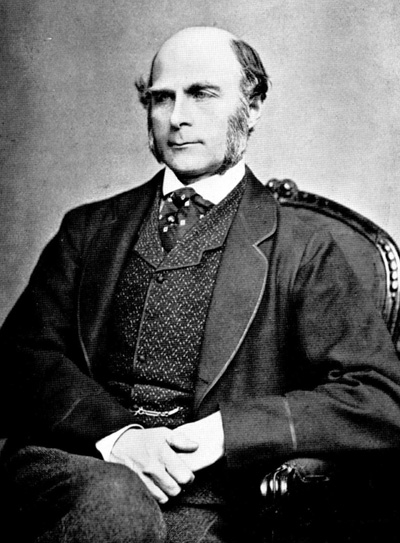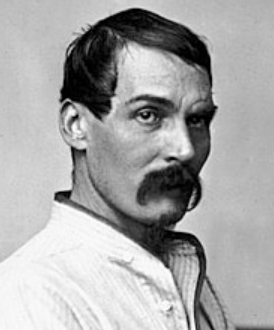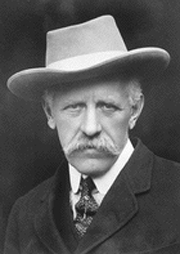explorers
Sir Francis Galton

On this date in 1822, Sir Francis Galton was born in Birmingham, England. The grandson of Erasmus Darwin and cousin of Charles, he was educated in mathematics at Cambridge. An inheritance in 1844 left him free to travel widely. He became a famous explorer, writing several books about his travels in Syria, Egypt and southwest Africa.
In 1863 he became general secretary of the British Association and published a book on weather mapping. His Hereditary Genius was published in 1865. Galton coined the term “eugenics,” defining it very differently from its current meaning. Galton founded a eugenics research fellowship and chair at University College. He also coined the term “nature versus nurture.” His study “Statistical Inquiries into the Efficacy of Prayer” was published in the Aug. 1, 1872, issue of Fortnightly View.
Galton charmingly showed how royalty, the most-prayed-for people in the world, “are literally the shortest lived” of the affluent. Galton observed: “It is a common week-day opinion of the world that praying people are not practical.” He made scholarly contributions to fields as diverse as fingerprinting and psychology. (D. 1911)
“Your book drove away the constraint of my old superstition, as if it had been a nightmare.”
— Galton letter to Charles Darwin, recorded in "Life and Letters of F. Galton" (1914)
Sir Richard F. Burton

On this date in 1821, Sir Richard Francis Burton was born in Great Britain. The colorful adventurer and explorer, educated at Oxford, served in the army in India, where he began to study languages and Muslim culture. Burton became fluent in nearly 30 languages. Posing as a pilgrim, he was the first non-Muslim to partake in the rituals of Mecca, writing a book about the experience.
He made famous translations of the Arabian Nights and the Kama Sutra, and traveled extensively in the Mideast, Africa and South America. Biographers, including his niece, Georgiana Stisted (True Life of Sir R.F. Burton), considered Burton a rationalist, at most an agnostic or deist. He was married to a highly superstitious Catholic woman who had last rites administered at Burton’s death. (D. 1890)
“The more I study religions the more I am convinced that man never worshipped anyone but himself.”
— Burton, in "Terminal Essay" from his translation of "Arabian Nights" (1885)
Fridtjof Nansen

On this date in 1861, explorer Fridtjof Nansen was born in Kristiania (now Oslo), Norway, and was educated at Kristiania University. Nansen took his first voyage in 1882 to the Greenland Sea, then was appointed curator of the Bergen Natural History Museum, where he met leading scientists and became a Darwinist. He made headlines in Norway when he skied across the mountains from Bergen to Kristiania to take part in sports competitions.
While working on his doctorate in zoology, Nansen became the first person to cross Greenland on skis. From 1893-96 he led a famous expedition to the Arctic. Although not quite reaching the North Pole, he became an international celebrity. Nansen helped negotiate the peaceful split between Norway and Sweden in 1905, then became Norway’s first ambassador to Great Britain.
A professor of zoology at Kristiania University for several years after his voyage, he returned to the university as rector magnificus responsible for the scientific vision of the institution. Nansen wrote up his exploits in The Norwegian North Polar Expedition and Northern Mists (1911). In the early 1920s when famine struck the Soviet Union, Nansen overcame diplomatic difficulties to engineer a successful prisoner swap between Russia and Germany and Austria-Hungary, involving more than 400,000 prisoners. For this humanitarian feat he was awarded the Nobel Peace Prize in 1922.
He worked with the League of Nations and International Red Cross, which used Nansen’s name on a special passport for refugees deprived by Lenin of their nationality during the Russian civil war. Refugees such as Stravinsky, Rachmaninoff and Chagall came to the West bearing the Nansen passport. After the award, Nansen brokered an “ethnic separation” between fighting Turks and Greeks, arranging a population exchange.
Nansen married twice and had five children. He was an atheist and was given a nonreligious state funeral featuring classical music but no elegies after dying of a heart attack at age 68. (D. 1930)
"[T]he religion of one age is, as a rule, the literary entertainment of the next."
— Nansen speech titled "Science and the Purpose of Life," published by the Rationalist Press Association (1909)
